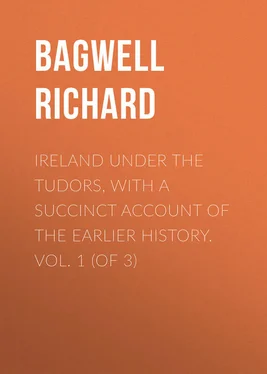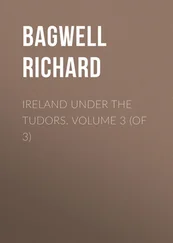Richard Bagwell - Ireland under the Tudors, with a Succinct Account of the Earlier History. Vol. 1 (of 3)
Здесь есть возможность читать онлайн «Richard Bagwell - Ireland under the Tudors, with a Succinct Account of the Earlier History. Vol. 1 (of 3)» — ознакомительный отрывок электронной книги совершенно бесплатно, а после прочтения отрывка купить полную версию. В некоторых случаях можно слушать аудио, скачать через торрент в формате fb2 и присутствует краткое содержание. Жанр: foreign_antique, foreign_prose, Историческая проза, на английском языке. Описание произведения, (предисловие) а так же отзывы посетителей доступны на портале библиотеки ЛибКат.
- Название:Ireland under the Tudors, with a Succinct Account of the Earlier History. Vol. 1 (of 3)
- Автор:
- Жанр:
- Год:неизвестен
- ISBN:нет данных
- Рейтинг книги:4 / 5. Голосов: 1
-
Избранное:Добавить в избранное
- Отзывы:
-
Ваша оценка:
- 80
- 1
- 2
- 3
- 4
- 5
Ireland under the Tudors, with a Succinct Account of the Earlier History. Vol. 1 (of 3): краткое содержание, описание и аннотация
Предлагаем к чтению аннотацию, описание, краткое содержание или предисловие (зависит от того, что написал сам автор книги «Ireland under the Tudors, with a Succinct Account of the Earlier History. Vol. 1 (of 3)»). Если вы не нашли необходимую информацию о книге — напишите в комментариях, мы постараемся отыскать её.
Ireland under the Tudors, with a Succinct Account of the Earlier History. Vol. 1 (of 3) — читать онлайн ознакомительный отрывок
Ниже представлен текст книги, разбитый по страницам. Система сохранения места последней прочитанной страницы, позволяет с удобством читать онлайн бесплатно книгу «Ireland under the Tudors, with a Succinct Account of the Earlier History. Vol. 1 (of 3)», без необходимости каждый раз заново искать на чём Вы остановились. Поставьте закладку, и сможете в любой момент перейти на страницу, на которой закончили чтение.
Интервал:
Закладка:
The constant quarrels of the colonists, and the corruption of their officials, laid them open to the attacks of the natives, and the state of Ireland attracted so much attention that the Parliament held at Westminster in 1331 advised the King to cross the Channel himself. Edward III. never had much time to attend to Ireland, but he seems to have been aware that he had duties in the matter. In 1338 he decreed that none but Englishmen born should fill legal offices; but this did not mend matters, and the administration of justice continued to be as corrupt as ever. The new comers married in Ireland, and were as ready to job for their children as if they had been descended from the first colonists. In 1341 the King ordered that Englishmen with estates in England should be preferred, but the supply of such men was necessarily limited. The main cause of the corruption prevalent was no doubt the poverty of the Crown. Officials were ill paid, or not paid at all, and they supported themselves by embezzling funds or by selling justice. An unjust proposal to increase the revenue by resuming royal grants naturally aggravated every evil, and the English by blood were arrayed against the English by birth. Sir John Morris, the deputy who was ordered to carry out the new policy, summoned a Parliament to meet at Dublin in October, 1341. But Maurice Fitz-Thomas, first Earl of Desmond, persuaded a large section of the nobility to ignore the writs, to attend a rival assembly at Kilkenny, and to draw up a remonstrance addressed to the King. The malcontents wished to be informed how a governor without military skill could rule a land where war never ceased, how an official could become quickly rich, and how it came about that the King was never the richer for Ireland? Edward abandoned the intention of resuming the grants, but subsequent events show that he did not really forgive Desmond.
Ralph d’Ufford had married Maud Plantagenet, widow of the murdered Earl of Ulster, and in 1344 he was sent over as Viceroy with very large powers. One of his objects was to resume possession of Ulster for the benefit of his step-daughter, the royal ward; but he totally failed in obtaining rent out of the lands, or in ousting those who had seized them. After chastising the Irish in the neighbourhood of Dublin, d’Ufford resolved to invade Ulster with a regular army. The MacArtanes attacked him at the Moyrie Pass, and he narrowly escaped annihilation. Having cut his way through with the help of the settlers in Louth and Monaghan, he made his way into the northern province, but no permanent results followed. Desmond and others having refused to attend his Parliament, the Viceroy went to Kerry, took Castle Island, and hanged its principal defenders. He imprisoned the Earl of Kildare and seized his estates, and then took action upon a bond executed in 1333, by which twenty-six of the chief men of the colony became bound for Desmond’s good behaviour. Many of the sureties had aided the Viceroy, but he, nevertheless, seized their lands. The Earl of Ormonde and two more were the only exceptions. The ruin caused by this policy was out of all proportion to the good, and in the history of the English in Ireland no one has a worse name than Sir Ralph d’Ufford, except perhaps his high-born wife, whose resentments were supposed to guide him. His hand was as heavy against the Church as against the temporal nobles. The annalist Pembridge, who was a contemporary, declares that he brought bad weather to Ireland, and that it lasted all his time. ‘On Palm Sunday,’ says the same writer, ‘which was on April 9, 1346, Ralph d’Ufford died, whose death was very much lamented by his wife and family; but the loyal subjects of Ireland rejoiced at it, and both the clergy and laity for joy celebrated a solemn feast at Easter. Upon his death the floods ceased, and the air again grew wholesome, and the common people thanked God for it.’
CHAPTER VI.
FROM THE YEAR 1346 TO THE ACCESSION OF HENRY VII
The Crown did nothing for Ireland. Torn by intestine quarrels, and denied a just government, the colony grew yearly weaker. Many of the settlers found their position intolerable, and, in spite of severe ordinances, absenteeism constantly increased. In 1361 Edward summoned to Westminster no less than sixty-three non-resident landowners, including the heads of several great abbeys, who derived revenues from Ireland and gave nothing in return. They were ordered to provide an army suitable for the King’s son Lionel, Duke of Clarence and Earl of Ulster by marriage, who proceeded to Ireland as Viceroy. He was accompanied by his wife, but failed, as D’Ufford had done, to obtain any profit from her lordship of Ulster, and was scarcely successful even against the clans near Dublin. The O’Byrnes and O’Tooles cut off many of his English soldiers, and the Duke was obliged to seek aid from the more experienced colonists. Like many governors who have come to Ireland with great pretensions, Lionel found his position most humiliating, and he spent a great part of his time in England. His authority was delegated to deputies, and the feuds between English by blood and English by birth ran higher than ever. In 1367 he returned and summoned a Parliament, whose enactments gave legal sanction to the fact that the King was no longer lord of more than a comparatively small portion of Ireland.
The statute of Kilkenny contains a great many rather heterogeneous rules. What makes it of such great importance is its formal recognition of the existence of an English Pale, and of a hostile Irish people outside it. The word Pale may not have been in use for a century later, but the thing was fully established.
The Parliament of Kilkenny did not, however, confine its attention to the narrow limits of the ‘four obedient shires.’ The distinction between English and Irish land was conceded, but it was still hoped that most of the shireland would be preserved to English law. The sheriffs or seneschals of ten counties or liberties, comprising all Leinster, except the modern King’s and Queen’s Counties, as well as Tipperary and Waterford, were required to produce their accounts at Dublin; but those of Connaught, Kerry, Cork, and Limerick were excused on account of distance, and were required only to attend commissioners of the exchequer when they came to their bailiwicks, and to render an account to them. Ulster, the Duchess of Clarence’s patrimony, is not even mentioned by her husband’s Parliament. Of the composition of that assembly we have no record, but it was attended by the Archbishops of Dublin, Cashel, and Tuam, and by the Bishops of Waterford and Lismore, Killaloe, Ossory, Leighlin, and Cloyne. The Archbishops of Cashel and Tuam and the Bishop of Killaloe were Irishmen; the rest were of English race, and some of them born in England.
The statute begins by reciting that for a long time after the conquest the English in Ireland spoke English, and in general behaved like Englishmen; but that of late years many had fallen away and adopted the Irish language and habits, whereby the King’s authority and the English interest were depressed, and the Irish enemy ‘against reason’ exalted. In order to remedy this marriage, fosterage, gossipred, and even concubinage with the Irish was declared high treason. Supplying horses and armour to Irishmen at any time was visited with like penalties, and so was furnishing them with provisions in time of war. Englishmen and even Irishmen living among the English were to speak English, to bear English names only, and to ride and dress in the English fashion, on pain of forfeiture until they should submit and find security. If they had no lands they might lie in prison till security was forthcoming. Special penalties were provided for offenders who had 100 l. a year in land. The English born in Ireland and in England were to be in all respects equal, and were not to call each other English hobbe or Irish dog, on pain of a year’s imprisonment and a fine at the King’s pleasure. War with the Irish was inculcated as a solemn duty, and the practice of buying off invasions was condemned. The end aimed at was that Irish enemies should be finally destroyed, and many minute rules were made for arming the colony properly. The rude Irish game of hurling was discountenanced, and the borderers were enjoined to make themselves fit for constant war by practising such gentlemanlike sports as archery and lance-play. Imprisonment and fine were to follow a neglect of these precepts. Provision was made to prevent the Irish from forestalling the markets by establishing fairs of their own, and from grazing their cattle in the settled districts. Very severe regulations were made against Irish hangers-on – pipers to wit, story-tellers, babblers, and rhymers, all of whom acted habitually as spies. The keeping of kerne and idlemen, armed or unarmed, at the expense of other people, was sternly forbidden, and qualified as open robbery. It became, nevertheless, the greatest and commonest of all abuses. Private war among the English was to be punished as high treason, and so was the common practice of enticing friendly Irishmen to acts of violence.
Читать дальшеИнтервал:
Закладка:
Похожие книги на «Ireland under the Tudors, with a Succinct Account of the Earlier History. Vol. 1 (of 3)»
Представляем Вашему вниманию похожие книги на «Ireland under the Tudors, with a Succinct Account of the Earlier History. Vol. 1 (of 3)» списком для выбора. Мы отобрали схожую по названию и смыслу литературу в надежде предоставить читателям больше вариантов отыскать новые, интересные, ещё непрочитанные произведения.
Обсуждение, отзывы о книге «Ireland under the Tudors, with a Succinct Account of the Earlier History. Vol. 1 (of 3)» и просто собственные мнения читателей. Оставьте ваши комментарии, напишите, что Вы думаете о произведении, его смысле или главных героях. Укажите что конкретно понравилось, а что нет, и почему Вы так считаете.












